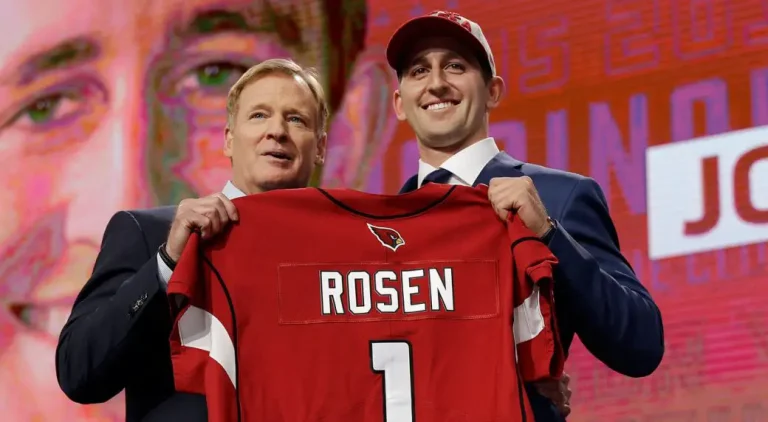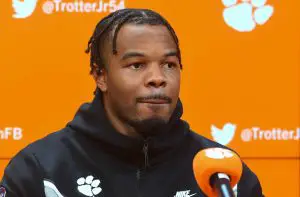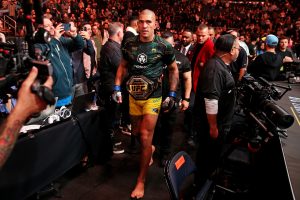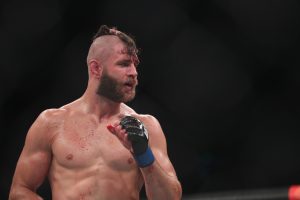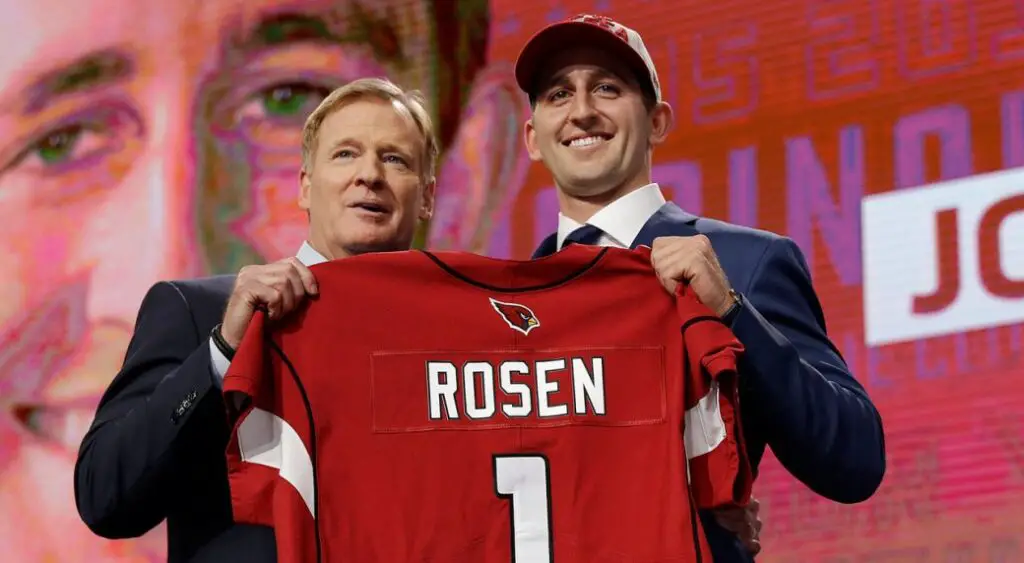
What do Josh Rosen, Brandon Weedon and EJ Manuel have in common? Well, the obvious answers are that they are all quarterbacks, they were all drafted in the first round, and they are all considered busts.
NFL teams, especially losing teams, have a habit of moving on from talented quarterbacks too quickly. They also have a bad habit of spending high picks on young quarterbacks who they hope will turn their franchise around. More often than not, scouting is not necessarily the issue. In a vacuum, a quarterback may look like an absolute stud on film. Josh Rosen, for example, looked like the most pro-ready quarterback in the 2018 NFL Draft.
So, if the problem is not bad scouting, and it’s not necessarily a player’s talent level, why do talented first-round quarterbacks constantly fizzle out in the NFL? In other words, if those things are not the issue, what IS the issue?
It is easy to blame draft busts, especially at the quarterback position, on the massive learning curve or the increased speed and skill level when moving from the college game to the NFL. A less obvious answer, however, requires some introspection from the teams themselves: situational awareness.
If the Cincinnati Bengals had decided to move on from Andy Dalton earlier and had taken Patrick Mahomes at pick 9 of the 2017 NFL Draft, would he have won a Super Bowl? Would he have earned an MVP award after having one of the best seasons by a quarterback ever? Would he be playing under a $503 million dollar contract this season? I think it is more than likely that the answer to all of those questions would be no.
The quarterback is the most important position in football. Since they touch the ball every single snap, quarterback play can often make or break a team. They are also the position on the field that is the most dependant on their teammates. Quarterbacks depend on the OC to call the correct play, the offensive line to protect him and the receiver to run the correct route, get open, and catch the ball. They also depend on the defence to put them in good situations. It is difficult enough for any young player to adapt to the aforementioned increase in difficulty when moving up the NFL without having to overcome poor offensive play calling, offensive line play, receiver play, and defence. That being said, it is important for a team to take a hard look at their situation in each of those positions before spending a first-round pick on a quarterback unless they’d like to be picking another one a few years after.
So, this situational awareness includes the following aspects of team infrastructure that a quarterback depends on: Offensive play calling, offensive line play, offensive weapons, and defensive play.
Offensive Play Calling and System
The offensive coordinator is potentially the most important coach for a young quarterback. What the OC calls on Sundays and their system can make or break a player’s entire career. There is something to be said about simply taking the best player available when drafting, but if an offensive coordinator’s style does not mesh with a specific quarterback, and there are no other quarterbacks that are available with first-round value, a team may be better off taking a receiver, offensive lineman or linebacker. For example, Greg Roman and Lamar Jackson are a match made in heaven. Roman has been known to run dynamic offences that make use of a quarterback’s mobility. Colin Kaepernick was electric under Roman and became significantly less-so when Roman left to coach for the Bills. Tyrod Taylor also flourished in Roman’s system, despite never having started a game before 2015. Lamar Jackson went from raw talent to the NFL MVP in the course of a year under Roman. Apart from an OC’s system, some offensive coordinators are simply not very good. Freddie Kitchens, for example, took a wildly talented offensive cast and drove them straight into the ground.
It is naive to think that any quarterback, especially a rookie, can fit into any offensive scheme with any offensive coordinator. The goal should be to take as much pressure as possible off of the quarterback so that they can shine and that starts with the offensive coordinator.
Offensive Line Play
The offensive line is often the difference between a good offence and a bad one. Often, dominant offensive lines lead to wildly successful offences. A solid group of big-men can turn a mildly-talented offence into a dominant one. When drafting a young quarterback, teams must take a hard look at how much they honestly trust their offensive to not only protect the quarterback but also to be able to successfully get the run game going. An immense amount of pressure is lifted from a signal-caller when they do not constantly find themselves having to convert on 3rd and a mile. The run game also sets up play-action opportunities when the defence is so concerned about stopping the run that they are not able to cheat their alignment. When the run game can keep the defence guessing, the quarterback gets more opportunities for big plays due to the fact that the defence is not sure what to expect. Simply put, a great run game creates more opportunities for receivers to get open through the play-action. A functioning run game also makes it more difficult for defences to successfully call blitzes. Therefore, a good offensive line means less pressure on the quarterback in the pass game directly, but indirectly as well through the run game.
Would you ask your 21-year-old rookie quarterback to attempt 40 passes in a game where the defence knows you are passing the ball in every one of those attempts? Ideally not.
Offensive Weapons
Does a quarterback make a receiver, or is it the other way around? The short answer is both. Tom Brady has won 6 Super Bowls by turning mediocre receivers into dominant ones more often than not. That being said, receivers are more often the ones that uplift the quarterback. A great example is Case Keenum. In 2017, Stefon Diggs and Adam Thielen combined for 155 catches (almost 40% of Keenum’s completions) and 2145 yards (60% of Keenum’s passing yardage). Spending most of his career as a backup, the combination of Thielen and Diggs meant was enough to uplift Keenum to a 13-3 record, an NFC North title, and a two-year 36 million dollar contract the next year.
It is extremely difficult for a rookie quarterback to overcome dropped passes and bad route-running. Any rookie at any position is bound to make many mistakes. These mistakes, however, are minimized to the untrained eye if receivers are able to bail a quarterback out. Imagine how frustrating it would be to make a perfect read, throw the perfect ball and have a receiver either drop the ball or be out of position. At a position where poise and confidence are so important, receivers who can make a young quarterback look good are absolutely necessary.
Defence
Would a quarterback be more or less successful if they started every drive inside their own twenty yard line? What about if they are made to close 14+ point deficits every game?
The answers to these two questions are obvious. Good defences are yet another group that the quarterback indirectly relies on. A defence that can force 3 and outs consistently and create turnovers is an invaluable asset to a young quarterback. Any time a defence can do these things, it amounts to a shorter field for the quarterback to lead his offence through. Would you rather trust a rookie QB to have to go 90 yards, or 45? While it is not impossible to score on the former, the latter option would take less plays, and less opportunity for mistakes.
Two Sides of the same Coin: Josh Rosen and Patrick Mahomes
Both selected 10th overall a year apart, Mahomes and Rosen could are on opposite sides of the spectrum. Mahomes was considered a project in 2017, whereas Rosen was considered a more “plug and play” type player. Why did their careers take such a different path?
Josh Rosen was drafted by the Arizona Cardinals, who would go 3-13 on the season. As quick as everybody was to blame it on poor quarterback play, I’m not entirely sure what people expected. 2018 saw A.Q. Shipley, Justin Pugh, D.J. Humphries, Mike Iupati, John Wetzel, Jeremy Vujnovich and Korey Cunningham all miss multiple games due to injury. The Cardinals practically had a different offensive line every week. David Johnson was coming off of a year where he missed 15 games due to a wrist injury. Johnson would not break 1000 yards rushing in 2018, averaging only 3.6 yards a carry. Arizona’s top receivers included a 35-year-old Larry Fitzgerald and 2nd round rookie Christian Kirk, who combined for a total of only 1324 yards. Possibly the most difficult circumstance was the 2018 Cardinals defence. That year, the Cardinals allowed 25 points or over in 8 games, including three games with over 40 points allowed, and two more games with over 30 points allowed. The Cardinals defence ranked 26th in points allowed and 28th in turnovers. While Bruce Arians is an exemplary offensive play-caller, injuries on the offensive line, a lacklustre receiving core, and terrible defence were too much to overcome for Rosen (and would be for almost any rookie quarterback). One year after being drafted, Rosen found himself watching as his team took Kyler Murray with the 1st overall pick of the 2019 NFL draft.
Patrick Mahomes, on the other hand, could not have been more different. After one year where he allowed to learn with no pressure (Alex Smith was the starter for the Chiefs in 2017), Mahomes would become the leading man in Kansas City. Mahomes was in the perfect situation. The 2018 Chiefs offensive line ranked 13th in the league. Mahomes’ two leading pass-catchers, Travis Kelce and Tyreek Hill, combined for a whopping 190 catches and 2815 yards. Andy Reid was has been offensive guru since he entered the league, and his constantly high-ranking offences used Mahome’s skillset perfectly.
While Mahomes is clearly a special player, his performance was greatly improved by the fact that the Chiefs’ had almost every piece in place for him to be successful. With Rosen, that was clearly not the case.
How Does All of This Apply to Drafting?
There is no formula to project a college QBs potential in the NFL when watching him play. What is controllable, however, is the infrastructure to help a young quarterback succeed. Every team wants to make a splash in the draft, but if NFL teams want to see less QB busts, they need to take a hard look at what they can offer in support of a young, highly-touted signal caller. One of the four major areas is able to be overcome by using the other areas. If a team has multiple major areas in need of improvement, and they pick a quarterback that needs to rely on these areas, more often than not they’ve wasted a first-round pick. In other words, it actually hurts a team if they are to pick a QB in the first round when they cannot support him.
Football is a sport that requires every player involved to do their job to be successful. A quarterback alone cannot save your franchise. If NFL teams start to be more introspective, we will see many less busts. Situational awareness, in my opinion, is as important as scouting, and I hope NFL teams can get that through their heads in the coming years.

